Now, let's have a look at the characteristics of your setting
Each rural setting has strengths and challenges - that's to some extent common sense and has been demonstrated and elaborated on by our research. Consequently, when it comes to rural development and innovative projects, it is helpful to consider the distinctive profile of resources of a region or village. We propose the so-called "capital framework" as a good way to assess strengths, resources or capabilities of a certain context (a group, a project, a farm, a village...).
On the next page, we'll ask you to reflect on the characteristics and resources of your setting and you can see the result straight away and add it to your personalised guide or have a blank template added to your guide to fill out later. We'll also introduce the capital framework. (If you feel that's too much reflection and theory, you can also skip both now and not have it in your guide.)
"Resources" are key to achieve results. Although at first glance they can seem scarce, there may be more available to us locally than we initially think, if we consider the full range of resources around us. To help you discover these, we suggest you fill in the resource wheel below, to help you visualise the resources that are available in your context. Your "personal" resource wheel will serve you later, when you can compare your wheel with the resource wheel from the practices suggested to you.
Resource Wheel
- The types of capital influence and interact with each other.
- The capital types include tangible (e.g. money, buildings, people) and intangible (values, shared memories, social skills) resources, or a mixture of both.
- Capital can be held by people, places and/or groups.
- One capital resource can enable access to or the creation of others.
Contacts and relationships with political decision-makers.
Biodiversity, scenic beauty, fertility of soils, cleanliness of water and air.
Identity and self-image, living traditions, cultural diversity, creative (social) association life.
Knowledge and skills of people.
People's social skills, for example empathy and solidarity, constructive handling of conflicts.
Public and private funds or the possibility of obtaining such funds.
Existing buildings that can be used as residential and commercial space or for community projects.
| Social value | Political value | Financial value | Built value | Natural value | Cultural value | Human value |
|---|---|---|---|---|---|---|
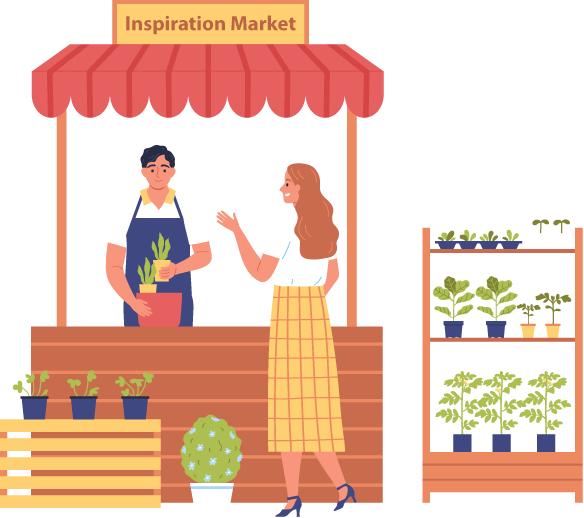
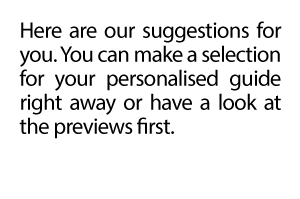

Good practices
Case studies
Inspirations
0










Sorry, we have no case studies / types of action matching your setting. Please have a look at the inspirational texts and the resource wheel






























Sorry, we have no case studies / types of action matching your setting. Please have a look at the inspirational texts and the resource wheel
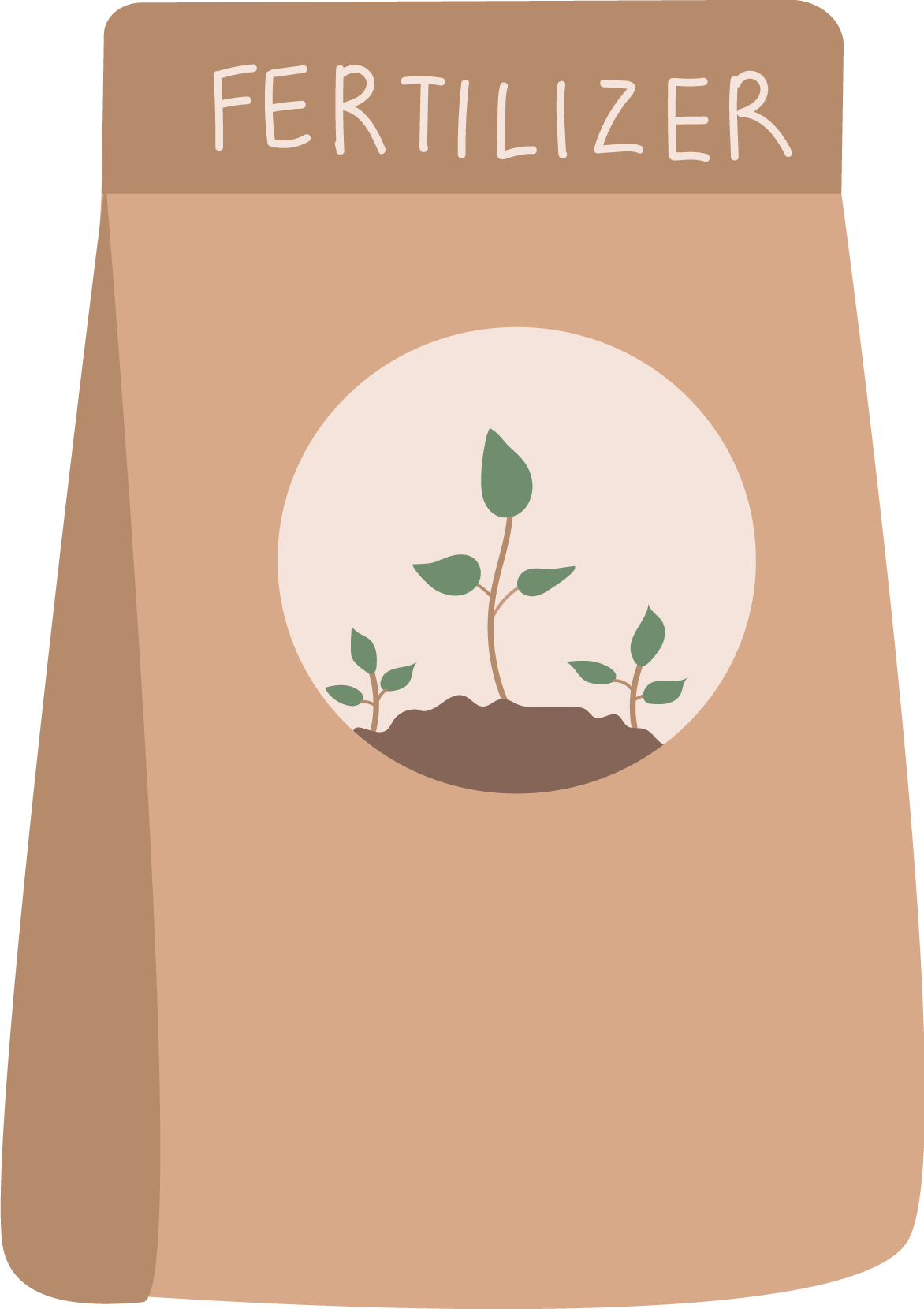



Welcome to our interactive Good Practice Guide generator!
So you are interested in ruralisation? This is great because it means you are joining others and contributing to creating new rural environments in Europe. This website wants to address practitioners mainly from rural professions and people who live in or want to live in rural areas. However, we also welcome people from other contexts who want to contribute to ruralisation.
Based on a wide range of case studies, types of action and overarching inspirational texts - resulting from the research project "RURALIZATION" - this website will pre-select resources that suit your context and we hope that you as a practitioner find relevant. Based on our suggestions (which are based on your role and local setting) you can compile your personal Good Practice Guide. This process will take approx. 15 minutes and the steps are as follows:
- Answering two questions so we can suggest matching resources to you
- Selection of resources
- Having a look at overarching inspirational texts - if you want to
- Thinking about resources of your particular context - if you want to
- Downloading your Good Practice Guide
- Getting started on the ground
If you are in a hurry right now, you can skip steps 1 to 4 and download all the information and work your way through it on your own. (However, this means you have to work your way through a lot of resources later.)
Skip and download the guidePlease be aware: this is not a survey, we will not document any of this information and none of the information that we provide has been statistically assessed. Please use your good judgement and common sense to decide which options to take. Now, let's talk less and go ahead!
Provide some information about you and your context: what is your current situation and interest, where you are located or planning to start a new life project and what type of resources are available to you in this context. The information you provide will only be used to select the most appropriate resources for you, as well as to illustrate your personalised guide with meaningful case studies from contexts similar to yours.
Which profile do you identify with most?
In case you don't identify with any of these, you might want to have a look at the compilation of all resources or the handbook for local authorities from our project.
Where do you come from? / Where will you move to?
Please choose what applies most.
This Good Practice Guide is for... (your projects title, your region or village)
Informations platform/ networks/ hubs
Community and knowledge sharing
Producer-consumer partnership/ short supply chain/ sales channel
Territorial marketing
Diversification
Collective action (e.g. farm collectives/ cooperatives)
Education & training
Agroecology
Farm incubator
Land portage, acquisition and management/ stewardship
The Versailles Plain’s Association and peri-urban agriculture diversification
The Versailles Plain Association is a facilitating body that brings together farmers, elected officials and civil society to protect and develop agriculture in the plain
Farming AgriCultures: the case of Apulian new entrants – Association and Agricultural Cooperative “Casa delle AgriCulture”
Promotion of a sustainable and inclusive model of rural development based on cultural actions and agroecological and multifunctional farming
Collective farms: A lever for an agricultural and rural transition?
Rural Professions’ Association in North Savo
Rural Professions' Association promotes the availability of new entrepreneurs and professionals for agriculture and forestry
The successors and new entrants in Hungary – Krisztina Pocsai and other farmers
How an economist became the founder of a community-supported agricultural enterpris, a farmer in a community of 45 families
Promising practice of the UK Farmstart Network and new entrants
An analysis of successes and challenges of the UK’s Farmstart Network coordinated by the Landworkers’ Alliance and some of its member organisations
Farma Martynika: an eco-tourism and educational farm showing that changing from urban to rural life is difficult but possible
This case shows the challenges of setting up an organic farm while illustrating how flexibility can help in improving the original operation model
Farms with strong citizen participation in the Netherlands and Belgium
Herenboeren Land van Weert (Netherlands) and Wassende Maan (Flanders) are two promising examples of farms in which consumers or citizens actively participate
Gut Wulksfelde GmbH – Balancing an entrepreneurial approach and ecological goals
The practice demonstrates how to establish a successful agricultural holding that combines ecological farming with the creation of jobs
Artystyka: an ecotourist farm that shows how art, local engagement and mutual respect can help newcomers take root in a rural community
The case of Artystyka shows how newcomers can successfully integrate in local community by combining ecotourism with art and social outreach based on respect
Remote work as a promising practice to attract newcomers to rural areas
Remote work can attract newcomers to rural areas, but diverse resources and conditions are needed to facilitate this
Castel del Giudice – A Municipality as an active agent of territorial marketing and economic initiative, voicing community needs
The case focus on the role of local authorities in regenerating rural areas through strategies addressing an ageing population and limited development opportunities
Renewal of the local development policy: personal networking and interknowledge
Starting from institutional structures, an informal network with common analyses and values was set up to support regeneration in Granville Terre et Mer
Rohrlack village / Landkorb GmbH & Co. KG – Social innovation leads to ecological and economic strength
The case shows how a small village in a structurally weak rural area can develop using social integration and new forms of food production and contribution
Newcomer artisans in Hungary
Pig breeding and meat processing based on the knowledge of the grandparents with modern innovations
Redeveloping empty farm stables for commercial purposes: Two cases from the Netherlands
This report shows how commercial redevelopment of empty farm stables may contribute to rural development and rural regeneration
Cultural festivals in Oldambt: A more positive image for a peripheral region
This report shows how four cultural festivals contribute to rural development and regeneration in the peripheral Oldambt area in the Netherlands
Landwege e.G. – A producer-consumer cooperative enables regional and organic food supply
The well-established cooperative brings together organic farmers and customers via selling regional and organic food in their own shops
Come Home project in Punkalaidun
The small municipality of Punkalaidun brings together municipality and parish to attract newcomers and returnees to move in
Maximising Organic Production Systems (MOPS)
This case study explores MOPS, a model optimising organic horticulture aligned with market demands, while also examining succession issues and small-scale organic producers
Family food production and processing on the outskirts of Warsaw: Cydr Chyliczki, Ludwik Majlert Farm and the Rysiny Farm
These cases show how family farming/food processing based on local supply chains can contribute to the preservation of local natural and cultural heritage
Farm diversification at succession
Biohoeve Hof te Muizenhole and De Speiboerderij are two promising farm practices in which successors successfully implemented diversification
Successful agro-ecological and multifunctional successor management in Sicily region
The case focuses on generational changes on 15 family farms taken over by successors
Vital agriculture and forestry in Uusimaa region
Farmers and successors were educated in farm investment and generational renewal
Coutances Terre et Mer: nature education as a rural/urban education driver
An agricultural training centre to teach and promote a form of agriculture linked to preservation of natural resources and openness to society
Slow Succession, Slow Revolution: regenerating the agri-food system in the Catalan Western Lands through agrobiodiversity and local food cultures
The case study covers farming regeneration processes in Catalonia (Catalan Western Lands), following the case of Cultures Trobades, an initiative that emerged from the Slow Food movement
CSA Hof Pente GbR – Success through community, education and ecology
Cooperatively organised community-supported agriculture combines organic farming with a wide range of education for sustainable development
Wine community of Mór (Hungary)
The case shows the cooperation of local wine producers towards protecting wine and cultural heritage-based development in the region.
Farm partnerships as a promising practice in the West of Ireland
Farm partnerships have been identified as a promising practice that may provide the first step of engaging in the process of succession and inheritance
Dávid Delinger – New entrants into farming
Innovation driving rural change
Exploring benefits that individual and community actions can have on the surrounding rural area.
In rural areas there is potential for innovation. Rural areas are full of resources that can support change and be the sources of rural renewal, such as:
- Rural society contains people and organisations with different types of skills, for example from their professional expertise to local knowledge.
- The rural economy contains businesses and entrepreneurs often of many types.
- More tangible assets such a built heritage, landscape, digital infrastructure.
- Less tangible assets such as culture and creativity.
Rural areas of course often have critical resource and skills gaps but:
- Individual projects and initiatives can also fill in the cracks.
- Problems are often interconnected and dealing with one rural issue can be the start of addressing another.
Transformative change may take time and experience bumps in the road. Tackling the key issues at the heart of rural decline is never simple or easy. However:
- Rural communities know the problems they face and need to address.
- Rural communities can underestimate the potential and skills they hold for innovation and how they have been innovative in the past.
- Rural innovation can simply be a new, promising approach to tackling a local problem and does not have to be a technical or scientific solution, but a more everyday innovation.
- Local actions may not seem radical but in hindsight become known as the catalysts of change where synergies emerged to drive an upward spiral.
Learning
Self-learning and learning from peers.
In contemporary times, knowledge has become something we can think about as gained in the classroom or from books. This is of course an important source of learning. However:
- There is also a wealth of knowledge and skills to learn from doing.
- We can learn a lot from our experiences and by doing, hands-on, in practice.
People that have spent their livelihoods focused on one profession often possess knowledge, skills and techniques that cannot be best learned in formal education settings.
- The farmer that has worked the same land for years will know the capacity of its soil and how this differs between their fields.
- The artisan that has honed their craft can demonstrate their methods but to truly learn their skilled ways will need closer and longer attention.
We can learn from others in the sense of the old idea of master and apprentice. If you might be lacking skills, important learning can also be gained from:
- Our closer peers, from understanding their approach and looking at it alongside ours.
- Spaces, places and time for this kind of learning to happen are also crucial, such as mentoring or peer to peer group exchanges.
- This can result in bringing together more formally, classroom learned knowledge with life-learned and practiced knowledge. Learning becomes produced and changed by collaboration that is shaped by a mix of different kinds of knowledge. Continual learning can build new skills - connecting with peers helps to enable these exchanges.
Networking for community building
Why network as part of a community building process?
Local people are key to innovation and rural change, but no man, community or project, is an island. Connecting with others is also important to initiate rural change and community building.
- This can unlock resources such as valuable feedback, new ideas, funding and even a shoulder to lean on when developing new projects and initiatives.
- Working as part of networks can also connect us with other groups that have particular important perspectives to take into account.
There are a range of other actors and stakeholders to consider.
- Government authorities, politicians, stakeholder groups, development organisations and educational institutions are some examples.
These actors and stakeholders may be local, but also perhaps regional, national and even international, depending on the issues and objectives the community is working to address. There could also be groups in other places already on the road your community is working to get on. They could:
- Have valuable experience to shape change in your community.
- Be potential collaborators to work with on cooperative projects and to upscale initiatives.
Skills
Diverse human skills as a rural change driver
When we think of our skills we can focus on know-how or the ‘hard’ skills we possess that might be gained through formal training or hands-on experience. But what is clear from our case studies is that also ‘soft’ skills are relevant for almost any project. Some people might be gifted with these skills while others acquire them through a life of work experience. A number of types of skills emerge from the case studies:
- Know-how in certain areas such as marketing, farming, food processing, law.
- Creativity and entrepreneurialism such as reinventing or creating a new farm business or community project.
- Interpersonal people skills such as networking, cooperation and collaboration.
- Supportive attitudes such as openness, commitment, persistence and ability to compromise.
- Wider aptitudes such as inspiring others, mediation and bringing people together.
The range of skills show how a more traditional view of rural skills as technical know-how isn’t the only driver of rural change.
- ➔ The skills link to the ‘human capital’ part of the Resource Wheel that also features as part of this Good Practice Guide.
The types of skills outlined above present a wide range of skills and aptitudes. At best, the people involved in our case studies had a good mix of these skills. This also means that not every person needs a full profile of skills, but everyone adds something valuable to the mix. Going beyond this, the case studies also give us hints around capitalising on the skills we possess and not letting those we don’t hold us back. Our previous inspirational texts also highlight key strategies. Some ideas on what is important are:
- Asking people for help and collaborating with others.
- An environment that supports life-long learning, where there is access to formal teaching and space for informal learning from peers.
Capital framework theory
The capital framework aims to systematically assess the strengths, capabilities or resources of a context or a person. These are called "capitals" and are classified into seven categories.
- Cultural capital: Attitudes and norms that influence outlooks and values and then influence actions. Also includes more tangible and intangible elements such as traditions and language. Can be shared by people and across places, but also can differ among people and across places.
- Human capital: Human potential e.g. talent, skills, knowledge, self-esteem, abilities, health and well-being. Can be developed informally or through formal education. Also wider services and institutions feed into it, such as health services.
- Social capital: Capital embedded within organisations, wider social networks and wider informal connections. Relationships that enable working together towards shared goals. Trust is also an important part of social capital, which can take the form of closer (bonding social capital) or loose ties (bridging social capital).
- Political capital: Empowerment and ability to influence change. Could translate into changes to policy and regulations or pressure to enforce existing governance instruments. Ability to influence may be determined by the nature of governance, e.g. bottom-up initiatives, multi-level governance.
- Financial capital: Economic capital or financial resources already possessed or access to, for example through enterprise and community organisations or the wider rural population e.g. income, access to credit, tax incentives, grants. This type of capital is more mobile and more straightforward to exchange and measure than other capital forms.
- Built capital: Range of human-made fixed assets such as infrastructure and buildings. Ownership can come in different forms (e.g. public, private or community).
- Natural capital: All renewable and non-renewable resources e.g. land, water, soil, forests, farm livestock, marine life, flora and fauna.
"Capital" refers to all the resources, the "treasures" that local people can draw on to develop their rural areas. These seven types of capital provide a broader view of the existing preconditions and the possibilities of self-determined rural development in a region. The capital framework takes into account that for example a place can have biodiverse and healthy nature while the built infrastructure might be in a very bad condition; or it can have reliable networks and local cooperation but an average financial situation. Such an analysis will help to understand a setting and consider its strengths and weaknesses.
The approach can also be helpful in case you want to transfer one of the case studies or apply one of the types of action from this guide to your own context. The so-called resource wheel is used as a tool to visualise the set of resources - or types of capital - for a given context and is depicted for all the case studies and types of action in this guide. By comparing your own wheel with the ones from the guide, you will be able to prioritise your activities and select the best starting point based on the best match of your "own resources" with the "required resources".
Embedded in rural areas is the potential for transformative change. Rural areas are full of resources that can support change. Rural society contains people and organisations with different types of skills, for example from their professional expertise to local knowledge. The rural economy contains businesses and entrepreneurs often of many types. More tangible assets such a built heritage, landscape, digital infrastructure and less tangible culture and creativity can also provide sources of rural renewal. Rural areas of course often have critical resource gaps but individual projects and initiatives can also fill in the cracks. Problems are often connected to others and dealing with one rural issue can be the start of addressing another. Transformative change may take time and experience bumps in the road. Tackling the key issues at the heart of rural decline is never simple or easy. However rural communities know the problems they face and need to address. Rural communities can underestimate the potential they hold for innovation and how they have been innovative in the past. Rural innovation can simply be a new, promising approach to tackling a local problem and does not have to be a technical or scientific solution, but a more everyday innovation. Local actions may not seem radical but in hindsight become known as the catalysts of change where synergies emerged to drive an upward spiral.
In contemporary times, knowledge has become something we can think about as gained in the classroom or from books. This is of course an important source of learning. But there is also a wealth of knowledge and skills to learn from doing. We can learn a lot from our experiences and by doing, hands-on, in practice. People that have spent their livelihoods focused on one profession often possess knowledge that cannot be learned more formally. The farmer that has worked the same land for years will understand the capacity of its soil and how this differs between their fields. The artisan that has honed their craft can demonstrate their methods but to truly learn their skilled ways will need closer and longer attention. We can learn from others in the sense of the old idea of master and apprentice. But important learning can also be gained from our closer peers, from understanding their approach and looking at it alongside ours. Spaces, places and time for this kind of learning to happen are also crucial, such as mentoring or peer to peer group exchanges. This can result in bringing together more formally, classroom learned knowledge with life-learned and practiced knowledge. Learning becomes produced and changed by collaboration that is shaped by a mix of different kinds of knowledge.
Local leaders are key to transformative change, but no man, community or project, is an island. Connecting with others is also important to support transformative change. This can unlock resources such as new ideas, funding and even a shoulder to lean on when developing new projects and initiatives. Working as part of networks can also connect with groups unlike ourselves that have particular important perspectives to take into account, such as young people and migrants. There are a range of other players to consider. Government authorities, politicians, stakeholder groups, development organisations and educational institutions are some examples. These players may be local, but also perhaps regional, national and even international, depending on the issues and objectives the community is working to address. There could also be groups in other places already on the road your community is working to get on. They could have valuable experience to shape change in your community. They might even be potential collaborators to work with on cooperative projects and to upscale initiatives.
How to use the wheel
The levels are subjective, this is not a mathematical model. You should select the level of resources available based on your perception: none, a little, some, abundant, unlimited.
To do so, hover your mouse over each type of capital to read its definition.
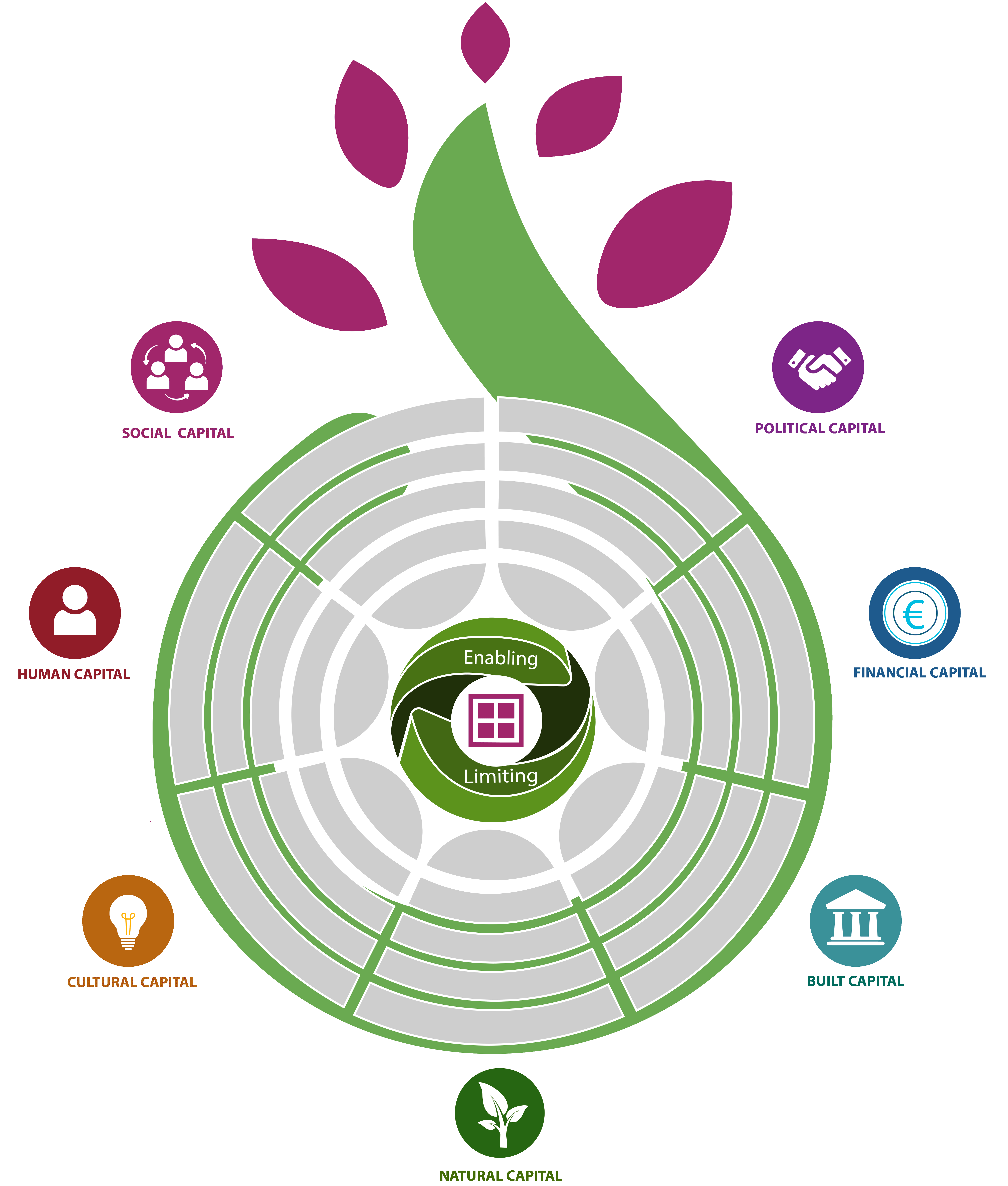
ruralization@consulta-europa.com
privacy@consulta-europa.com
Copyright © All Rights Reserved
Ruralization@consulta-europa.com
Privacy@consulta-eruopa.com
Copyright © All Rights Reserved
